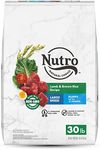Buying Guide for the Best Large Breed Puppy Foods
Choosing the right food for your large-breed puppy is crucial for their healthy growth and development. Large-breed puppies have unique nutritional needs compared to smaller breeds, especially because they grow quickly and are prone to certain health issues if not fed properly. When selecting a food, it's important to look beyond marketing claims and focus on the nutritional content and how it matches your puppy's specific needs. Understanding the key specifications will help you make an informed decision that supports your puppy's long-term health.Protein ContentProtein is essential for muscle development and overall growth in puppies. For large-breed puppies, the protein content should be balanced—not too high, as excessive protein can contribute to rapid growth, which may stress developing joints. Most large-breed puppy foods have protein levels between 22% and 30%. If your puppy is very active, you might lean toward the higher end, but for most, a moderate protein level is ideal. Always check that the protein comes from quality animal sources, as this is more digestible and beneficial for your puppy.
Calcium and Phosphorus LevelsCalcium and phosphorus are minerals that play a key role in bone development. Large-breed puppies are especially sensitive to the balance of these minerals; too much can lead to skeletal problems, while too little can hinder proper growth. Look for foods with controlled calcium (around 1.0% to 1.5%) and phosphorus (around 0.8% to 1.2%) levels, and a calcium-to-phosphorus ratio close to 1.2:1. This balance helps ensure steady, healthy bone growth. If your puppy is growing very quickly, it's even more important to avoid foods with excessive calcium.
Fat ContentFat provides energy and supports healthy skin and coat. For large-breed puppies, fat content should be moderate, typically between 8% and 15%. Too much fat can lead to rapid weight gain, which puts extra stress on developing joints. If your puppy is very active, a slightly higher fat content may be appropriate, but for most, staying in the middle of this range is best. Always consider your puppy’s activity level and body condition when choosing the right fat content.
Kibble Size and TextureLarge-breed puppies have bigger mouths and teeth, so the size and texture of the kibble matter. Larger, firmer kibble pieces encourage chewing, which can help with dental health and slow down eating. If your puppy tends to gulp food, larger kibble can be especially helpful. However, if your puppy is very young or has trouble chewing, you may need to start with slightly smaller or softer pieces and transition as they grow.
Added Nutrients (Glucosamine and Chondroitin)Glucosamine and chondroitin are supplements often added to large-breed puppy foods to support joint health. These nutrients can help protect developing joints and cartilage, which is important for large breeds prone to joint issues. While not strictly necessary for every puppy, they are a good addition if you want to be proactive about joint health, especially if your puppy’s breed is known for hip or elbow problems.
AAFCO StatementThe AAFCO (Association of American Feed Control Officials) statement on the packaging indicates whether the food meets established nutritional standards for growth. Look for a statement that says the food is formulated for 'growth' or 'all life stages,' and ideally, that it is specifically suitable for large-breed puppies. This ensures the food has been tested or formulated to meet the needs of growing puppies, giving you confidence in its nutritional adequacy.













